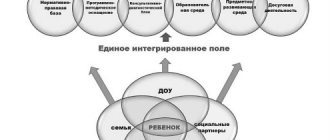“There are no children born by chance. Not a single Traveler of Eternity is born by chance. Every child is a phenomenon in earthly life. He was born because he had to be born. Born because that’s what the world needed.” From the book by Shalva Amonashvili “Hurry, children, we will learn to fly!”
The birth of a sick child is always a tragedy for the family. For nine months, parents and all family members waited impatiently and joyfully for this baby. The birth of a child with developmental disabilities is a disaster, a tragedy. The normal cycle of family life and the psychological climate in the family changes. The birth of a child with developmental disabilities is always stressful for the family. The problems of raising a “special” child most often become the cause of deep and lasting social maladaptation of the entire family. Parents find themselves in a difficult situation: they experience pain, grief, guilt for having such a child, and often fall into despair. The family most often moves away from friends, acquaintances, and relatives. Families often break up (70%), the mother alone takes on the entire burden of raising a sick child on her shoulders.
The level of development of any community has always been determined by its attitude towards people with disabilities. And Russia is no exception. In our modern society, it is difficult for a child with disabilities to enter society, and it is difficult for society to accept him. The inclusion of the family in the field of interaction with society is the main stabilizing factor.
If a child with disabilities is studying at school, the family interacts with teachers, social workers, psychologists, other specialists, as well as the children's team, at least to a small extent. However, many children are homeschooled.
Parents of children with disabilities face a number of problems:
- isolation of parents from the parent community;
- lack of contact between the child and peers;
- fear, fear that the child’s relationships with peers will not work out;
- lack of an objective picture of the educational process at school;
- Finding parents “alone” with their child’s problems.
The development of a child with disabilities is impossible without broad conscious contacts and constant communication with different people. Parents often try to protect their child’s social circle, fearing that his relationship with ordinary children will not work out, that he will be offended, that he will not be able to find a common language. In the future, this may cause him to develop a depressive state, since those around him do not understand, avoid him, and he does not know how to establish contact and build friendly relations.
The task of a teacher in the fate of a child with disabilities is, first of all, to work with parents. What does it mean to work with parents? Collaboration, inclusion, participation, learning, partnership—these concepts are commonly used to define the nature of interactions. “Only together with parents, through common efforts, can teachers give children great human happiness” ( V.A. Sukhomlinsky ).
An old aphorism says, “The hardest thing about working with children is working with their parents.” The main goal in the work of an educational psychologist with the family of a child with disabilities is to help the family cope with the difficult task of raising a child with disabilities, to promote the family’s social adaptation, and to mobilize its capabilities. The psychologist acts as a mediator between the child and the adult, the child and his environment, and also as a mentor in direct communication with the child or his environment.
Education
Nadezhda Vladimirovna Tretyakova
Webinar
WEBINAR: Preschoolers with behavioral and communication disorders: psychological and pedagogical support in preschool educational institutions based on behavioral therapy methods
Participate
Basic principles for organizing work with parents of children with disabilities:
- accept students with disabilities “like any other children in the group”;
- include them in the same types of activities, although setting different tasks;
- involve children in collective forms of learning and group problem solving;
- use other forms of collective participation: games, joint projects, laboratories, competitions, quizzes, knowledge reviews, etc.
Main areas of cooperation with parents:
- psychological and pedagogical education of parents;
- involvement of parents in the educational process;
- participation of parents in managing the educational process.
The main forms of interaction with parents of children with disabilities are individual, group and collective work.

